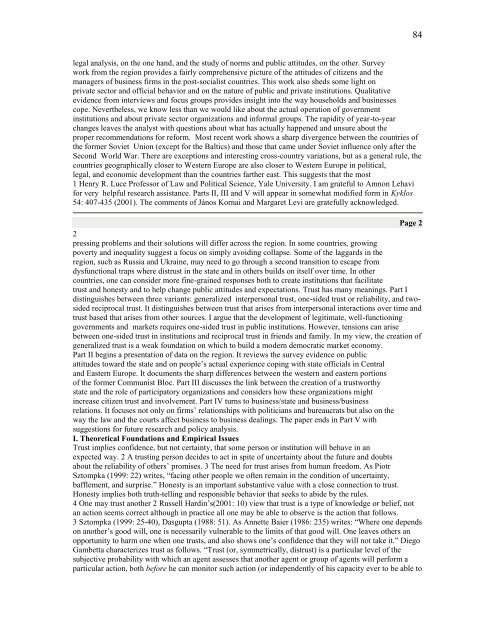FILSAFAT KORUPSI - Direktori File UPI
FILSAFAT KORUPSI - Direktori File UPI
FILSAFAT KORUPSI - Direktori File UPI
Create successful ePaper yourself
Turn your PDF publications into a flip-book with our unique Google optimized e-Paper software.
legal analysis, on the one hand, and the study of norms and public attitudes, on the other. Survey<br />
work from the region provides a fairly comprehensive picture of the attitudes of citizens and the<br />
managers of business firms in the post-socialist countries. This work also sheds some light on<br />
private sector and official behavior and on the nature of public and private institutions. Qualitative<br />
evidence from interviews and focus groups provides insight into the way households and businesses<br />
cope. Nevertheless, we know less than we would like about the actual operation of government<br />
institutions and about private sector organizations and informal groups. The rapidity of year-to-year<br />
changes leaves the analyst with questions about what has actually happened and unsure about the<br />
proper recommendations for reform. Most recent work shows a sharp divergence between the countries of<br />
the former Soviet Union (except for the Baltics) and those that came under Soviet influence only after the<br />
Second World War. There are exceptions and interesting cross-country variations, but as a general rule, the<br />
countries geographically closer to Western Europe are also closer to Western Europe in political,<br />
legal, and economic development than the countries farther east. This suggests that the most<br />
1 Henry R. Luce Professor of Law and Political Science, Yale University. I am grateful to Amnon Lehavi<br />
for very helpful research assistance. Parts II, III and V will appear in somewhat modified form in Kyklos<br />
54: 407-435 (2001). The comments of János Kornai and Margaret Levi are gratefully acknowledged.<br />
Page 2<br />
2<br />
pressing problems and their solutions will differ across the region. In some countries, growing<br />
poverty and inequality suggest a focus on simply avoiding collapse. Some of the laggards in the<br />
region, such as Russia and Ukraine, may need to go through a second transition to escape from<br />
dysfunctional traps where distrust in the state and in others builds on itself over time. In other<br />
countries, one can consider more fine-grained responses both to create institutions that facilitate<br />
trust and honesty and to help change public attitudes and expectations. Trust has many meanings. Part I<br />
distinguishes between three variants: generalized interpersonal trust, one-sided trust or reliability, and twosided<br />
reciprocal trust. It distinguishes between trust that arises from interpersonal interactions over time and<br />
trust based that arises from other sources. I argue that the development of legitimate, well-functioning<br />
governments and markets requires one-sided trust in public institutions. However, tensions can arise<br />
between one-sided trust in institutions and reciprocal trust in friends and family. In my view, the creation of<br />
generalized trust is a weak foundation on which to build a modern democratic market economy.<br />
Part II begins a presentation of data on the region. It reviews the survey evidence on public<br />
attitudes toward the state and on people‘s actual experience coping with state officials in Central<br />
and Eastern Europe. It documents the sharp differences between the western and eastern portions<br />
of the former Communist Bloc. Part III discusses the link between the creation of a trustworthy<br />
state and the role of participatory organizations and considers how these organizations might<br />
increase citizen trust and involvement. Part IV turns to business/state and business/business<br />
relations. It focuses not only on firms‘ relationships with politicians and bureaucrats but also on the<br />
way the law and the courts affect business to business dealings. The paper ends in Part V with<br />
suggestions for future research and policy analysis.<br />
I. Theoretical Foundations and Empirical Issues<br />
Trust implies confidence, but not certainty, that some person or institution will behave in an<br />
expected way. 2 A trusting person decides to act in spite of uncertainty about the future and doubts<br />
about the reliability of others‘ promises. 3 The need for trust arises from human freedom. As Piotr<br />
Sztompka (1999: 22) writes, ―facing other people we often remain in the condition of uncertainty,<br />
bafflement, and surprise.‖ Honesty is an important substantive value with a close connection to trust.<br />
Honesty implies both truth-telling and responsible behavior that seeks to abide by the rules.<br />
4 One may trust another 2 Russell Hardin‘s(2001: 10) view that trust is a type of knowledge or belief, not<br />
an action seems correct although in practice all one may be able to observe is the action that follows.<br />
3 Sztompka (1999: 25-40), Dasgupta (1988: 51). As Annette Baier (1986: 235) writes: ―Where one depends<br />
on another‘s good will, one is necessarily vulnerable to the limits of that good will. One leaves others an<br />
opportunity to harm one when one trusts, and also shows one‘s confidence that they will not take it.‖ Diego<br />
Gambetta characterizes trust as follows. ―Trust (or, symmetrically, distrust) is a particular level of the<br />
subjective probability with which an agent assesses that another agent or group of agents will perform a<br />
particular action, both before he can monitor such action (or independently of his capacity ever to be able to<br />
84

















